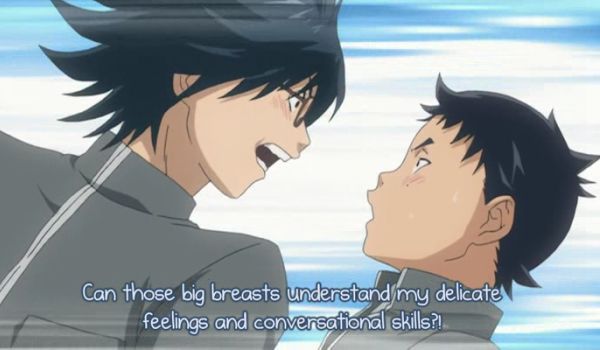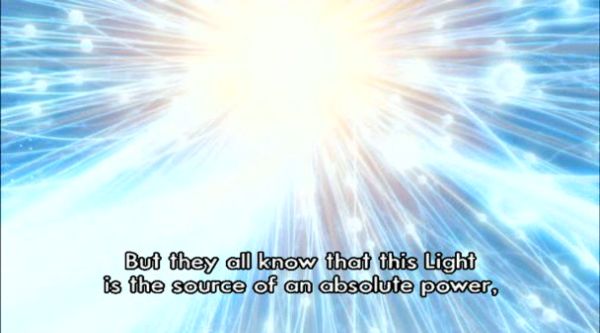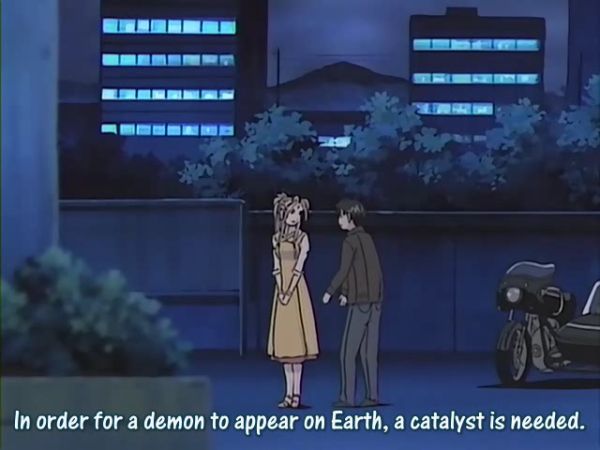Screenshot from the anime “The Laws of Eternity”, also by Ryuho Okawa. The protagonists visits the angelic realm in heaven and is surprised to find a number of famous Japanese industrialists there. Because creating prosperity for others is the will of the Light / God / Buddha. Just in case this wasn’t obvious, he also wrote a book about it.
Infinite prosperity — wouldn’t that be nice around now? What with the move and the frozen water pipes and all. But I am talking about the book I ordered from Amazon.co.UK before Xmas and which I found in my mailbox when I came home late yesterday. Another book by Ryuho Okawa, its full title is The Philosophy of Progress – Higher Thinking for Developing Infinite Prosperity. Both Okawa himself and the publisher inform us that the book will need to be read several times, but what don’t you do for infinite prosperity. Or even for higher thinking, I suppose. Your enthusiasm about thinking may vary. Then again, so may your prosperity.
The book is, as usual, made from several sections that originated as speeches and were later adapted to written form. They vary in tone, more than usual, with one being very simple, as if aimed at children or people with well below the IQ of the average Japanese. Okawa strives to be easy to understand, but this was unusual even for him. Anyway, the different speeches help see things from slightly different angles, which should be helpful.
This is not a New Age book about “attracting” wealth, like the popular understanding of “The Secret” and “Think and grow rich”. The idea of attracting wealth is an abomination to Okawa, as it is to any right-thinking person. On the contrary, the purpose is to CREATE prosperity, so that it flows out from you, not toward you.
In contrast to the right-thinking person, who wants to create prosperity and let it flow out to others, I sometimes talk about “left-thinking” people, who want to draw in prosperity from other people and consume it. This is of course a kick in the shin to socialism, which by historical accident has become associated with the left hand. But it actually goes much further back, to the Old Testament, where Ecclesiastes says that “The heart of the wise inclines to the right, but the heart of the fool to the left.” (Ecclesiastes 10:2) The idea that we should all divide the cake and not bother about baking it is as foolish as they come. But this is not merely, or even mainly, a political problem.
For instance, you may feel that someone does not give you the respect you expected. A left-thinking person will say, out loud or in their mind: “You better respect me!” They may then go on to treat the other person with disrespect and even encourage others to do the same, to restore the balance. But a right-thinking person will first jump to another conclusion: “Perhaps that person sees some flaw in me that I have overlooked, or perhaps I have just not done enough to merit their respect. I have to do better.” It may of course be that the other person lacks respect and gratitude in general, but unless you are their parent, this is not something you can fix directly. And it could certainly also happen that you just haven’t done anything particularly impressive. (I know this is generally the case for me, but then I don’t expect much above bare civility either.)
Now in all fairness Okawa is mainly a spiritual teacher, and so the prosperity he talks about is mainly spiritual. But he certainly isn’t opposed to a little cash for the true believers. He does discuss Jesus’ warning about rich people, camels and needle eyes. Much like me, Okawa believes the problem was attachment to material things, rather than the things themselves. (Not unexpected, since Okawa claims to be the Buddha reborn and the Buddha was very much about getting rid of attachment.) Unlike me though, Okawa is fairly optimistic about people having lots of money without getting attached to it. That may be doable for someone who vividly remembers being king of Atlantis and stuff like that. But for us commoners, it is hard to not get carried away by riches. I would not be so sanguine about it. I’m more with Jesus on this one. Big surprise, eh?
Okawa does make the valid point that these days, if you go the route of poverty you will be tempted by communism. Jesus presumably did not have that dilemma. Also, according to Okawa, it would be a problem if only bad people got rich and not good people, because the bad people would have way more power compared to their numbers, and there is plenty enough of bad people in power as is. My problem with this is the good people who turn to bad people when they get rich, because they fall in love with the power and prestige and forget their original purpose in life. I tend to hold the attitude of Proverbs 30: Give me neither poverty nor riches, “Otherwise, I may have too much and disown you and say, ‘Who is the LORD ?’ Or I may become poor and steal, and so dishonor the name of my God.” Of course, “not poverty” today is a bit different from 3000 years ago…
Luckily Okawa goes on to focus in great detail on the purpose of progress in this world. It is not to hoard stuff for ourselves, but to expand our mission of causing as much happiness as possible in this world while we are here. And financial progress is only one contribution to that, not the goal. For instance, a company cannot be said to truly make progress if the employees don’t feel joy about working there. A company should be run in such a way that the happiness of the employees and business associates increases over time. The company should also contribute to society through taxes. Okawa foretells continued decline for America as long as the nation continues to see tax evasion as an admirable activity.
(As leader for the Happiness Realization Party, Okawa favors drastic tax cuts in Japan. What he refers to in his book is presumably not having as high taxes as possible, but being as honest as possible and paying the taxes intended by the society you live in.)
The book is quite multifaceted, as are his books in general. One of the unsuspected jewels appears while he discusses the hells relevant to greedy people, the Hell of Hungry Spirits and the Hell of Strife. While there anyway, he stops by the Hell of Lust for a paragraph or two. I think I will write about that in a separate entry, if ever.
Anyway, to not get completely lost in the details: Prosperity is not about having lots of money. That’s incidental, although people who know the Truth cannot possibly become destitute. True prosperity is about manifesting an ever increasing amount of happiness: First in your own life, and as soon as practically possible to begin spreading this happiness to people around you, in ever wider circles, until the whole world is brightly lit with hope and joy.
Okawa should know what he speaks of in this regard. From being a fairly ordinary young man he has brought forth an organization that is dedicated to creating utopia through love, wisdom, self-reflection and progress. Millions of people have bought at least some of his books, and if they enjoyed them as much as I do, that is a good amount of happiness right there. And take my word for it, it is not easy to write in a way that fills people with hope and strength of will. I’m still working on it though!
As I said when I ordered the book: “When I have infinite prosperity, I’ll be sure to share it with my friends.” Work in progress!










